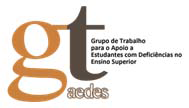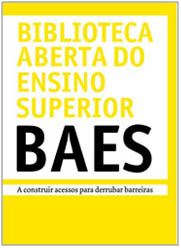Students with Special Educational Needs
Psychological Support
Monitoring Committee
The CIÊNCIAS Department created the Monitoring Committee to address issues related to students with Special Educational Needs. This committee includes a representative from the Directorate, the Chair of the Pedagogical Council, a representative from each of the CIÊNCIAS departments, a representative from the Student Association and GAPsi. The Monitoring Committee works in collaboration with department representatives in this area, thus creating an extended working group.
The Monitoring Committee has no decision-making power, but rather an advisory role, monitoring and referring different issues concerning students covered by this status.
The objectives of the Monitoring Committee for students with Special Educational Needs are:
To centralise information related to issues concerning students with Special Educational Needs;
To survey the needs of these students;
To find compromise solutions to the various issues that arise;
To provide faster and more effective channels of communication between these students, teachers, departments, management and other faculty services;
Develop initiatives that contribute to improving the condition of these students in CIÊNCIAS;
Disseminate useful information to both students and other CIÊNCIAS bodies or agents;
Refer students with disabilities to the appropriate services for the different issues that concern them;
Support teachers in the difficulties they encounter in framing and pursuing the objectives contained in the Statute for Students with Special Educational Needs;
Support teachers in other matters relating to students with Special Educational Needs.

Margarida Cruz
President of the Education Board

Luís Narciso
Department of Biology

Ana Cristina Figueiredo
Department of Biology

João Calvão Rodrigues
Department of Earth Sciences and Energy

Fernanda Diamantino
Department of Mathematical Sciences

Francisco Fatela
Department of Earth Sciences and Energy

Isabel Nunes
Department of Informatics

Cristian Barbarosie
Department of Mathematical Sciences

Margarida Botte
Departamento de Química e Bioquímica

Cláudio Pina Fernandes
GAPsi - Psychological Support Office

Jéssica Silva
Inclusion and Integration Department of the Students' Association
Special Status for Students with Special Educational Needs
Students with Special Educational Needs have the right to be integrated into academic life, and regulations are a way of ensuring equal opportunities. Due to the lack of specific ministerial legislation for higher education, the Faculty of CIÊNCIAS published its first internal regulations in 1999, making it one of the first higher education institutions to do so. Thirteen years later, on 12 May 2012, regulations for the entire University of Lisbon were published, the result of joint work by the different schools.
As a result of the merger between UL and UTL, the current Regulations for Students with Special Educational Needs (SEN) of the University of Lisbon were published on 11 May 2016. This document is complemented by specific regulations for the Faculty of CIÊNCIAS, published on 21 November 2017.
Regulations for Students with Special Educational Needs at ULisboa, approved by Order No. 6255/2016, of 11 May.
Regulations for Students with Special Educational Needs at CIÊNCIAS, approved by Order No. 10069/2017, of 21 November.
Scholarships for Students with a Disability Rating of 60% or Higher
Students with a disability equal to or greater than 60% may apply for a scholarship corresponding to the amount of tuition fees actually paid. To apply for the scholarship, students must:
Prove the degree of disability through a multi-purpose medical certificate of disability;
Have their tax and social security contributions in order.
The application process is carried out via an online form, after accreditation.
Order approving the regulations for this scholarship
This scholarship is independent of the normal scholarships awarded by the Social Services of the University of Lisbon, so students may apply for both scholarships.
Workroom
The Central Library, in Building C-4, has a work room specially designed for students with disabilities, with adapted equipment and some support furniture. The equipment currently available to students is as follows:
A scanner;
An A3 printer;
An Everest Braille printer;
Braille printing paper;
40-character Braille line;
Two CCTV (text magnifiers);
A Page Turner;
A programmable trackball;
An INPROMAN interface;
Intellikeys Concept Keyboard;
Three computers equipped with specific software for students with reduced vision or blindness (Screen Reading with Speech Synthesiser; Character Magnification; Overlay Marker; OCR; GRID);
Internet connection terminals;
Lockers;
Work tables.
In addition to this fixed equipment, over the last few years CIÊNCIAS has been supporting the acquisition of compensatory equipment for its students, namely Braille displays, laptops, hearing aids, audio recorders and wheelchairs.
Teacher support resources
GAPsi provides direct support to teachers on aspects related to SEN students and their specific characteristics. Complementary documentary resources are provided below, with the aim of promoting a quick access to information about SEN and may be useful in aspects related to academic experience.
Presentation session of the Resource Centre for professors, 24 November 2025 (PowerPoint only available to registered users).
Provision of Psychopedagogical Support
As the main functional responsibility of GAPsi, psycho-pedagogical support is also provided to students with disabilities, seeking to provide a more targeted response to some of the specific issues arising from these students' experiences in the academic context.
Sometimes, integration issues are also associated with entering higher education, with a change of place of study, changes to the social support networks created in secondary education, increased study demands associated with less personalised teaching, etc. In this case, GAPsi seeks to intervene in order to promote the integration of students in a way that is both effective and rewarding.
NEE Network - Special Educational Needs Network of the University of Lisbon

CIÊNCIAS is one of the member schools of the Special Educational Needs Network of the University of Lisbon (NEE network). As such, it plays an active role in various aspects of the lives of its students with special educational needs through a range of practices. These include: identifying, disseminating and implementing good practices, as well as sharing resources to improve attendance and academic success.
The NEE network also has its own website, where you can find information and resources at http://redenee.ulisboa.pt.
GTAEDES - Working Group for the Support of Students with Disabilities in Higher Education

GTAEDES (Working Group for the Support of Students with Disabilities in Higher Education) is made up of public higher education institutions and its mission is to provide a better quality service to students with disabilities; promote closer ties between services that support students with disabilities; facilitate the exchange of experiences; develop joint initiatives and promote the rationalisation of resources.
BAES - Open Library for Higher Education
The Working Group for Support to Students with Disabilities in Higher Education (GTAEDES) has developed several initiatives to provide better conditions for attendance and effective participation of students with disabilities attending higher education. One of the projects carried out by this group was the creation of the Open Library for Higher Education (BAES).

BAES is a Virtual Library, where the entire document collection is available in alternative formats that have been created over recent years in educational institutions. This project, ‘building access to break down barriers,’ allows all documentation to be made available on the internet, enabling any student belonging to one of the institutions that have signed the protocol to access information in alternative formats produced by the others. BAES was a project funded by POS-Conhecimento.
What is the Open Library of Higher Education?
It is a library with content accessible online (http://baes.up.pt). It is the result of a partnership between nine public higher education institutions and consists of three main areas: information production, access to information and information sharing.
What content?
It already has a collection of over 3,000 titles in Braille, audio and full text. As it is a developing structure, BAES currently offers information in the area of Social CIÊNCIAS and Humanities. In the short term, the aim is to expand production to Mathematics, Music and Chemistry; increase the number of titles in the core areas and, in the medium term, introduce new ones.
Information Production
With properly equipped production units, work is being done to increase production (e.g. study materials) and diversify accessible formats, while expanding production to new areas.
Access to Information
Each institution provides new information access points equipped to allow users with a wide range of specific needs to access not only BAES, but also other resources (bibliographic and multimedia).
Information Sharing
It integrates and makes available via the web content produced in alternative formats, allowing direct access to full-text content.
How to access the information?
As BAES is intended for students with Special Educational Needs, those interested will have to request accreditation from one of the project partners in order to access the content. As full content is made available on the website, this is a way of protecting copyright, which does not apply in the same way to people with Special Educational Needs.
Partner Contacts
U. Porto: saed@letras.up.pt | UTAD: certic@utad.pt | U. Minho: gaed@reitoria.up.pt | U. Aveiro: difusao@doc.ua.pt | U. Coimbra: atped@dtp.uc.pt | U. Lisbon: div.alunos@reitoria.ul.pt | FLUL: saa@fl.ul.pt | CIÊNCIAS: gapsi@ciencias.ulisboa.pt | U. Évora: nae@uevora.pt